|
Lispocephala vitripennis
|
|
| olep |
Posted on 13-11-2023 15:54
|
|
Member Location: Posts: 75 Joined: 16.06.23 |
I think that this is a female Phaonia, if so is it possible to say what species it is? -or a few "candidates" that I can check further? Wing about 4-5 mm Found on a house wall outside Stockholm Sweden november 2023 Edited by olep on 26-11-2023 08:44 |
|
|
|
| olep |
Posted on 13-11-2023 15:56
|
|
Member Location: Posts: 75 Joined: 16.06.23 |
other side in different light |
|
|
|
| olep |
Posted on 13-11-2023 15:57
|
|
Member Location: Posts: 75 Joined: 16.06.23 |
body |
|
|
|
| olep |
Posted on 13-11-2023 15:58
|
|
Member Location: Posts: 75 Joined: 16.06.23 |
head |
|
|
|
| olep |
Posted on 13-11-2023 15:59
|
|
Member Location: Posts: 75 Joined: 16.06.23 |
wing 4-5 mm and head |
|
|
|
| olep |
Posted on 13-11-2023 16:00
|
|
Member Location: Posts: 75 Joined: 16.06.23 |
hindlegg
Edited by olep on 13-11-2023 16:01 |
|
|
|
| John Carr |
Posted on 13-11-2023 18:12
|
|
Member Location: Posts: 9773 Joined: 22.10.10 |
Lispocephala? |
|
|
|
| olep |
Posted on 14-11-2023 09:33
|
|
Member Location: Posts: 75 Joined: 16.06.23 |
Many thanks John for finding the right genus.Here in Sweden the most common species are Lispocephala alma and L. erythrocera but there are as far as I know 7 other species. After looking at images my main candidate is L. alma but I'm not sure if it is possible to make an identification from photos? |
|
|
|
| John Carr |
Posted on 14-11-2023 11:36
|
|
Member Location: Posts: 9773 Joined: 22.10.10 |
Lispocephala alma has black spots over crossveins and on margins of the scutellum. In America I have only seen it in early spring. If it overwinters as an adult there must be adults in November too. I have never seen them flying in fall. |
|
|
|
| olep |
Posted on 14-11-2023 16:00
|
|
Member Location: Posts: 75 Joined: 16.06.23 |
Many thanks John for your new answer/response. I agree with you this is not L. alma. The crossveins are not right, the margin of the scutellum has no spots and and the front tarsus are dark without a light part of the tarsus, see my photo and an example on this link https://www.naturbasen.dk/observation/774064/lispocephala-alma Further more most observations of L. alma in Sweden are also in the spring months, there are a few observations in the autumn but I'm not sure if the identification of them are right And as I understand it, it is not the second most common species L. erythrocera either. So it should be one of the other more uncommon 7 Swedish Lispocephala |
|
|
|
| Johane |
Posted on 26-11-2023 00:55
|
|
Member Location: Posts: 1962 Joined: 27.08.13 |
Hi, Ole sent me the specimen, and after examination of its genitalia it turned out to be Lispocephala vitripennis Ringdahl, 1951. For identification I used this paper: https://www.resea...a_Muscidae Johan Ennerfelt |
|
|
|
| Johane |
Posted on 26-11-2023 00:57
|
|
Member Location: Posts: 1962 Joined: 27.08.13 |
5th sternite
Johan Ennerfelt |
|
|
|
| olep |
Posted on 26-11-2023 08:43
|
|
Member Location: Posts: 75 Joined: 16.06.23 |
Hi Johan Many thanks for helping me with the identification of the Lispocephala vitripennis BR Ole |
|
|
|
| Jump to Forum: |


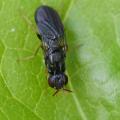



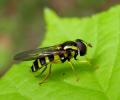
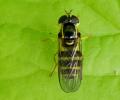

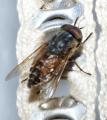
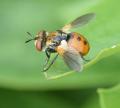



 but don't see the image in the post.
but don't see the image in the post.
